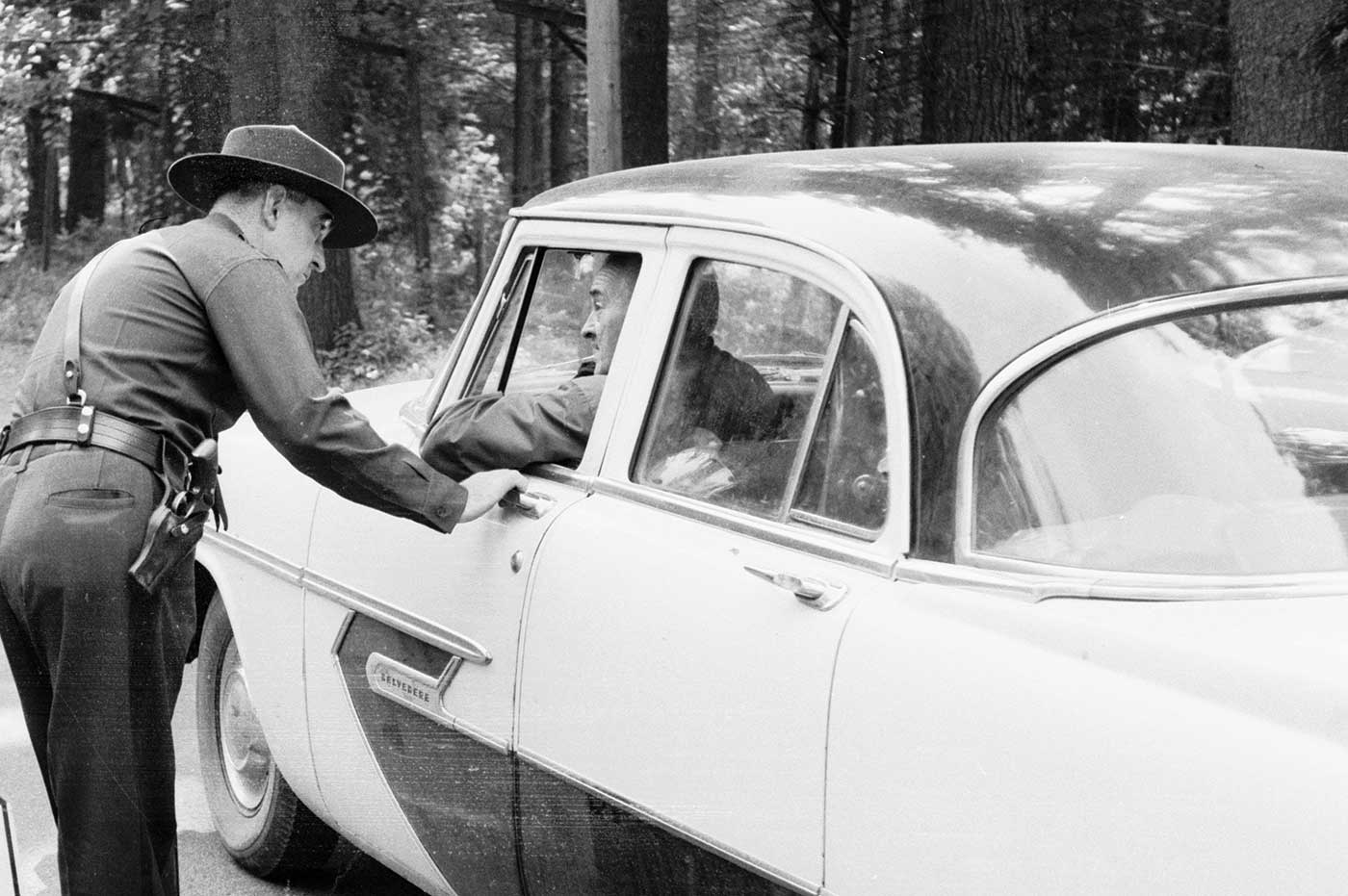they have “probable cause to believe….the vehicle contains evidence of criminal activity or contraband.” This includes searching compartments and containers (such as the passenger’s purse in this case) whose contents are not in plain view. One should never underestimate the near pervasiveness of circumstances which exist allowing the police to take the first step towards invoking the “automobile exception” nor fail to appreciate that taking advantage of this pervasiveness is an intentional design of modern policing. That first step is simply lawfully pulling over the vehicle. In his recent book “Talking to Strangers”, author Malcolm Gladwell outlines in Chapter 11 (entitled “Case Study: The Kansas City Experiments”) how the warrantless search of vehicles became, and has remained, an important technique in the arsenal of the police designed to get weapons off the streets. Indeed, in a footnote to the McGee case, which dealt with the intent of the officers in stopping Mr. McGee’s car, it is revealed that one of them admitted that his role as an officer on Stockton’s Community Response Team was to “perform [ ] proactive traffic stops…..try [ ] to deter crime, find things, anything that’s illegal.” There are almost countless reasons for being lawfully stopped by police while driving. The California Vehicle Code is lengthy. No driver is perfect. Rolling through right turns on red lights, not stopping before the line at intersections and failing to signal a lane change are obvious examples of common violations. But there are myriad other pitfalls when considering that failing to advance quickly enough upon a light turning green or failing to make a right turn “as close as practicable to the right-hand curb” are enough to permit the police to pull over an automobile. The list of erratic or sloppy driving errors that can result in a stop on a suspicion of driving under the influence is long and almost veers into the realm of the subjective. Then, of course, there are the violations relating to the vehicle itself (brake lights, etc.) and license place registration, such as in the present case.
The Court of Appeal, citing Ornelas v. United States (1996) 517 U.S. 690, noted that once a car is pulled over, the trigger for establishing probable cause sufficient for the encounter to move into a warrantless search of the entire vehicle and its contents is whether the facts and circumstances “are sufficient to warrant a man of reasonable prudence in the belief that contraband or evidence of a crime will be found.” The analysis then turned to the issue of cannabis and the particular facts and circumstances informing the stop and search of Mr. McGee and his vehicle.
The People argued that the discovery of any amount of marijuana, even a lawful amount, supplies sufficient probable ground to search the vehicle. It is noted that under California law it is legal for an individual aged 21 or older to possess up to 28.5 grams of marijuana (California Health & Safety Code section 11362.1(a)(1)). This argument should give one serious pause when considering that the very State that passed legislation legalizing cannabis was now advancing an argument that mere possession of a substance it had legalized was sufficient grounds to search an entire car and all of its compartments and the bags and containers stored within it without a warrant. But the State was not pursuing a legal frolic. For years after Proposition 64 was enacted in 2016, as noted by the Court of Appeal while referencing People v. Fews (2018) 27 Cal. App. 5th 553, 562, “courts still held officers may still conduct a probable cause search pursuant to the automobile exception to determine whether a subject is properly adhering to statutory limitations on possession and use that remained in effect.” [Emphasis added] Nonetheless, the Court of Appeal rejected the State’s argument. The Court of Appeal, relying on People v. Lee (2019) 40 Cal. App. 5th 853, found that the discovery of a legal amount of marijuana without any additional evidence to support a reasonable belief that there is an illegal amount present is insufficient to justify a probable cause search under the automobile exception. This is good news for anyone pulled over for rolling through a stop sign with a fresh salmon on their back seat as, applying the principles followed by the Court of Appeal, the police would not be permitted to search the entire car because you may have quantities of fish in the trunk in excess of those allowed according to the California Department of Fish and Wildlife 2020 Ocean Salmon Sport Regulations. You can come up with your own examples.
However, unfortunately for Mr. McGee, the Court of Appeal’s analysis, and the State’s arguments, did not stop at examining the amount of marijuana discovered in his passenger’s cleavage. The State relied by analogy on People v. Souza (1993) 15 Cal. App. 4th 1646, 1653 which held that an open container of alcohol is sufficient to establish probable cause to search a car. The Court of Appeal agreed. Relying on California Health and Safety Code section 11362.3 (a) (4) which makes it unlawful to possess an open container or package of cannabis or cannabis products while “driving operating or riding in the passenger seat…of a motor vehicle”, the Court of Appeal held that, just as in Souza, supra, the presence of contraband (an unsealed container) “provided probable cause to believe the passenger possessed other open containers” and thus justified the search of the car and the passenger’s purse. The Court of Appeal expressly stated that the situation in the case before it was somewhat analogous to Fews, supra where the defendant was pulled over holding a half-burnt marijuana cigar in his hand and there was a smell of burnt cannabis coming from the car, thus supporting the inference that the defendant was driving under the influence and/or driving while in possession of an open container of marijuana, thus giving reasonable probable cause to search the car.
Mr. McGee had also advanced an argument that his case was analogous to In re D.W. (2017) 13 Cal. App. 5th 1249. Contrasting McGee to In re D. W. illustrates the permissiveness of the automobile exception justification for warrantless searches. In In re D.W., the police approached a group of individuals, some with known gang association. One of them, 17-year-old D.W., smelled of marijuana and ultimately admitted to the having just smoked some. The police decided to search D.W. for more marijuana and discovered a revolver in his backpack. D.W. moved to suppress the evidence of firearm offenses on the basis that the search was an invalid because it did not properly fall within search incident to arrest exception to the requirement for a warrant. The Court of Appeal originally rejected D.W.’s argument but after subsequent jurisprudential developments, the California Supreme Court transferred the case back to the Court of Appeal for reconsideration. The Court of Appeal revered its earlier decision and suppressed the evidence. D. W. maintained that since neither smelling, nor being under the influence, of marijuana is a crime there was no probable cause to arrest D.W., and thereby search him incident to a valid arrest. The Court of Appeal agreed. The Court of Appeal noted that “when a custodial arrest is made, and that arrest is supported by independent probable cause, a search incident to the custodial arrest may be permitted.” The Court of Appeal referenced People v. Macabeo (2016) 1 Cal. 5th 1206 where the defendant had rolled through a stop sign on his bicycle and pictures of underage girls were found on his cell phone which the police had searched incident to his Vehicle Code infraction stop. The Court in Macabeo stated that “[t]here is no exception for a search incident to citation.” The In re D. W. Court of Appeal indicated that while the police had searched D.W. because of his marijuana smell and admitted ingestion, the possession of less than 28.5 grams was a mere infraction punishable by a fine under the Health and Safety Code and that smoking marijuana was a “minor, nonjailable offense” under California law. Further, and importantly, the Court of Appeal stated that “even if the officers could reasonably conclude” that D. W. possessed marijuana “it would have been mere conjecture to conclude that he possessed enough to constitute a jailable offense.” Thus the Court of Appeal held that the police “had neither cause to make a custodial arrest nor evidence that he was guilty of anything more than an infraction” and found the warrantless search failed to satisfy the search incident to arrest exception and was unreasonable under the Fourth Amendment. The Court of Appeal in McGee, dealing in that case with the automobile exception, reminded that that exception “requires only a showing of probable cause the vehicle contains contraband or evidence of a crime” and where such probable cause exists the police may search the vehicle even if the offense ‘is an infraction and not an arrestable offense.” Indeed, the McGee Court of Appeal explicitly held that the “distinction between misdemeanors and infractions is irrelevant to the probable cause analysis under the automobile exception.”
In summary, possession of a legal amount of cannabis, properly stored, is not sufficient grounds to search a vehicle pursuant to the automobile exception. However, if the substance is not properly stored in a sealed container, there is probable cause to search the vehicle for other open containers (i.e. contraband), even though the offense of an open container is only an infraction and not a crime. A much easier threshold to cross than a search incident to arrest which requires probable cause of a crime (not just an infraction) leading to the arrest before a search is justified.









